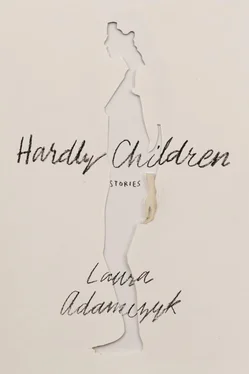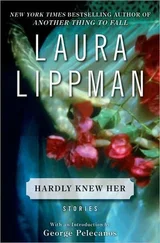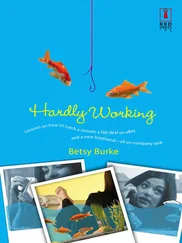In the movie version, the wife is a crone, a controlling, uncaring woman whom we want to not only see left but also shamed, made to realize the ways she’s failed. If only she had been kinder, the man’s car wouldn’t have broken down. The wife’s hair is stringy and limp, her eyes the insensate gray of the drugged. She barely lifts her gaze from the boxy television as the man leaves the house, goes back to watching a made-for-TV movie, a woman with long, glossy hair found dead, bent and angular, in an alley. It makes it easier, in this same version, for the man sitting in the theater—after having sat for too long, after having given the woman too much time to walk away from the small, old theater—to finally rise, rush up the dark aisle through the lobby’s soft, buttery light, and out into the now-damp chill of evening. Easier for him to look one way down the lamplit street—always the wrong way first—then the other. To run now, to turn the corner, to see her from afar and call her name.
In most versions, there is no man. No unreliable car or woman with hair like silk, hair like curled ribbon, hair like old string. There is no short house to leave from, no dimpled couch sunken into a shrug or pieces of chicken in a cardboard bucket next to a six-pack of Schlitz in the fridge. In no version is the night warm, romantic, or mysterious. No version in which the season means anything at all. After a few years screening adult films and B movies, the single-screen theater in the small town closes and does not reopen for many years, if it ever reopens. Instead of a house, there is a blank, dry field near the interstate. There is the distant whoosh of passing traffic that sounds like fabric being ripped. Bottles and old pieces of pipe in the dead grass, crumpled paper garbage that has been tossed from above, and at the front of the lot, an orange plastic fence that arcs downward in a lazy collapse. In one version, there is a FOR SALE sign pushed into the earth and people who might do something with the space. In another version, there is no field.
THE MAN DRIVES A TRUCKand has a glorious beard. It’s leather brown and looks impenetrable, like the after of a Just for Men commercial. He says, You probably wouldn’t be interested in someone like me. We’re in a bar on the edge of a college town, and my friends and I look like the grad students we are. They don’t understand why I like to come here, where there will be people we don’t know.
What department are you in?
History, I say.
I would have guessed science.
Because of the glasses?
They’re dark-rimmed and thick—massive. Someone once told me I looked like Woody Allen in them. Not the exact compliment a woman wants to hear, but I don’t mind. It’s kind of true.
What kind of truck do you drive? My dad used to work for Peterbilt.
Oh yeah? It’s a—
How much room is there in the cab?
* * *
IT’S COZY IN THATlittle bed area behind the seats. The cushion takes up the whole space except for small cubbies in the walls. One has a tiny TV/DVD player in it; another is tall and holds a rack lined with Carhartts. The trucker places our shoes in an empty recess, tucking in the laces. He’s taped up a bunch of old-fashioned postcards on the walls. Lots of pronouncements from states that don’t get enough attention. Iowa: You Make Me Smile. Missouri: Let us show you the Show Me State! I like when young people collect old things. A way to say: everything used to be just a little better before. It makes the trucker seem interested in his world but not overly clever, like he’s not going to be making any jokes I don’t get.
I came straight up from Missouri, he says. Didn’t even stop at home. I just needed to be around people . He looks at me and smiles, scratching carefully beneath the rim of his dark knit cap. I’ve suddenly grown shy, always more interested in good lines than in actually delivering on them. It’s crowded with the two of us back there, and when he finally puts his arm around me and we take off our clothes, it is as though our lovemaking is all a complicated way of saving space. You know, we’d have more room if I could just put this here and you put that there … It feels like Tetris, like packing boxes in a different kind of truck, and I think maybe I should have gone into the sciences. All that spatial reasoning, something about conservation of energy.
Afterward, we lie perfectly creased into each other’s bodies.
I say, You must be really good at folding maps.
He says, You’re beautiful.
I bite my lip.
I could get used to this, he says, and I wonder what I’ve gotten myself into.
* * *
HE JUMPS OUTof the truck then helps me down, and I have a vision of women wearing laced-up boots and full, complicated skirts, of a man pulling them from horse-drawn carriages. What kind of hat would I wear?
He wants my number. He lives here and wants to see me when he’s in town.
How often are you here?
A couple days every couple weeks.
It seems like the right amount. He hands me two scraps of paper—one with his number on it, the other blank. I’ve left my purse inside the bar. The trucker looks like a bigger version of a dirty, whiny folk singer I like. His cap is now off, his hair an unkempt overgrowth on his head and face, his lumberjack jacket zipped all the way up. I want to tell him who he reminds me of, but instead I write down my number, because he only looks like a singer-songwriter. I trust he will not whisper in infinite harmony with himself about his ex-girlfriend. He’ll just be.
As he pulls away, he looks down at me from his perch. I crank my fist up and down, and he pulls his horn. Haa-honnn.
Inside the bar my friends have quarantined themselves at a corner table, debating the Teapot Dome Scandal. They wave their arms and throw their heads around—a flock of pigeons pecking at the same piece of garbage. When I say hello, they look at me like they forgot I came with them. The virgin I’ve been seeing narrows his eyes at me and asks, Where were you ?
* * *
THE NEXT MORNINGI call my grandmother. It’s my grandparents’ sixty-eighth wedding anniversary, and I tell her congratulations, my voice sounding small like a child’s, something that happens when I talk to her. I ask her if she and Grandpa did anything special today, and she laughs and says with a sigh, Ohhh, no, nothing special, just the usual. They went to church, she says, and ate lunch at the local family restaurant. It’s called Family Restaurant. I can immediately recall the limp pickle spears and sheets of iceberg that came with my burgers from Family Restaurant when I was a kid, how my dad would pull fries off my plate and replace them with sprigs of parsley. How he would order a tomato juice and shake pepper and Tabasco and A.1. into it, then below the table tip vodka in from a pocket flask. We’d cheers as though drinking champagne, tiny bubbles popping in my soda. I tell Grandma that sometimes the old places are the best ones, and she agrees and asks me if it’s snowing where I am, only a couple of hours south of where she is. There’s snow on the ground, I say, but just a little. Then we talk about how much we like snow—this is the Midwest and we like snow—and she says that she and my grandfather shovel the walks themselves, but that the high school kids still cut through the yard and muck it all up. I tell her that the mailman does the same thing. Although what I say is true, I’m partly talking for effect—I hope that she will appreciate me, someone much younger than herself, complaining about disrespectful people ruining my perfect blanket of snow. I tell her how I wait for the mail, getting really excited, and how nothing good ever comes. Bills, offers for credit cards, coupons to fast-food restaurants. On Sunday evenings I watch 60 Minutes just for Andy Rooney. I want to trim back his eyebrows the same way I want to clear the ice from the walks. Grandma says, Your father used to love to shovel the walks when he was a kid. He’d do the whole block without even being asked. She’s been doing this to me a lot since July. Laying out some little piece of something that I never knew about him and can no longer ask him about. I’m glad she tells me this stuff, but all the details—snow shoveling, his Cub Scout badges, serious, unsmiling yearbook photos—seem misplaced and wrong, like excerpts from another man’s history.
Читать дальше











